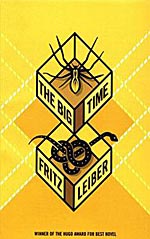
![]() verkisto
verkisto
7/26/2016
![]()
Fritz Leiber is one of those authors I feel like I should read more, for a variety of reasons. I've read one of his books already (The Dealings of Daniel Kesserich), over 20 years ago, and remember nothing about it, save for the fact that I gave it two stars in Goodreads. Recently, a buddy of mine started reading the Fafhrd and the Gray Mouser series, and I thought I would tackle another of Leiber's stories. I went with The Big Time, since it was shorter, had won a Hugo, and was free.
The Big Time makes me wonder what the hell people were thinking in the 1950s that this won a Hugo. Sure, the ideas are thought-provoking, but that's really all that could be said of it. It reminds me of the days when genre fiction could be about ideals, and still be worthy enough of publication and recognition. Luckily, we've come a long way since then, where the story has to take precedence over the idea.
The idea behind The Big Time is intriguing -- a time war has been going on for billions of years, fought by soldiers from all points in history and the universe -- and Leiber does a great job of worldbuilding and crafting the backstory over the first few chapters. The story then devolves into a locked-room mystery, but honestly, if I hadn't seen that mentioned in another review I read after finishing the book, I wouldn't have caught it. It should have served as the plot, but instead it's used as a means for Leiber to write about philosophy via his wooden character monologues. I wish the narrative and plot had been more engaging, to support the idea behind the story. It was dry, lacking characterization and tension, despite it being centered on a diverse group of people who have strong bonds and are thrown into a desperate situation. The book was about as compelling as paint, and as engaging as Melba toast.
The story was first published in 1958, and, sadly, it shows through the narrative. Aside from some of the language feeling dated, the characters felt dated, too. The narrator makes a remark about another character "arguing like a woman" when he makes a "Well, they did it first" kind of retort. To make it worse, the narrator in this story is also a woman. Interestingly enough, it was hard for me to lock on to the narrator as a woman; there's something about the narrative that suggests it's being told from a man's perspective. The story was written by a man, which could be a part of it, either from his perspective or mine, but I've read other books written by men and featuring a female narrator, and didn't have that kind of disconnect.
I read an ebook edition of the book, which was fine, for the most part. The story didn't have typos or OCR glitches, but it did truncate a lot of the text in the epigrams. For some reason, that text was formatted at a specific length, which my Kindle reader didn't fit to the page. It wasn't a huge bother (to me, epigrams -- outside of the Myth Adventures books -- are just there for flavor), but it was a minor annoyance.
I feel like I can't judge Leiber completely off of the two short novels of his I've read, but they don't put me much in mind to read anything else he's written. I may decide to tackle the Fafhrd and the Gray Mouser series at some point in the future, but it's not high on my list. His style doesn't do anything for me, and his stories thus far haven't been resonant.